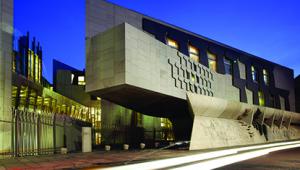In a submission to the Commission on Local Tax Reform, whose members include CIPFA Scotland head Don Peebles, the institute and its directors of finance section also dismiss the idea of a local income tax.
That option was rejected by the Scottish Parliament under the Scottish National Party’s previous minority administration, but remains SNP policy.
“Our focus is on practical and achievable improvements,” the CIPFA paper says.
“For that reason we restrict our comments to a system of property-based taxation and discretionary tax powers.”
Though the paper opts for a system broadly similar in principle to the present council tax, it suggests a number of reforms, some of which are likely to be politically contentious.
Noting that the present council tax is based on 1991 property values, the paper calls for an immediate full revaluation, with provision for regular revisions thereafter.
Ministers privately accept that any new property-based tax will need more up-to-date data, but they will not view this prospect with relish. It was the potential electoral toxicity of a property revaluation under the old domestic rates system that prompted Margaret Thatcher’s Scottish ministers to bring forward introduction of the poll tax – with politically incendiary results. Since then, successive governments have shied away from a new revaluation.
“Local accountability is not served by the lack of transparency which arises from the failure to revalue domestic properties,” the paper says.
“With the passage of time, increasingly out-of-date valuations erode the underpinning logic of the present local tax.”
Local accountability takes priority in the paper, with CIPFA Scotland demanding an end to the council tax freeze, which was agreed between Scottish ministers and the Convention of Scottish Local Authorities (Cosla) in 2007 and is due to run until at least next year’s Holyrood election. The Scottish Government has compensated councils for the cost of the freeze to the tune of £560m.
“Local tax should be set and raised locally without intervention by the Scottish Government,” the paper says.
It wants councils to be given discretion to set council tax levels, and to levy additional local taxes if they so wish. Edinburgh Council, for example, has wanted to bring in a “bed tax” on visitors to the city, as operates in many tourist destinations, but Holyrood blocked the move in 2012.
“We consider that the conditions now exist to enable local democracy to be further enhanced by broadening the range of local discretionary tax powers available to local authorities,” the CIPFA Scotland paper says.
It also concedes that the council tax, as currently structured, is seen to be insufficiently progressive or directly linked to ability to pay. A new version should include more property bands at both ends of the value scale, a streamlined system of reliefs and statutory periodic revaluation.
The paper wants greater help for tax-payers to distinguish between local tax and charges for water supply, which remains publicly owned in Scotland. It accepts that councils should continue for administrative convenience to collect the water charges, but wants bills itemised more clearly.



















